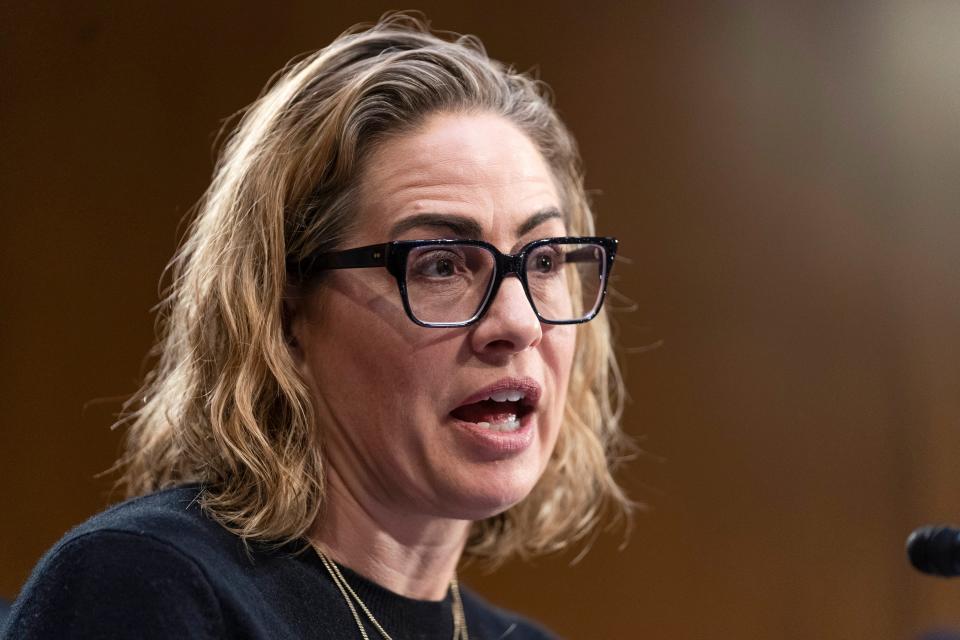Sen. Kyrsten Sinema retires: Here's a look back at 10 key moments in her political career
- Oops!Something went wrong.Please try again later.
U.S. Sen. Kyrsten Sinema’s retirement announcement on Tuesday points to the end of a political career that broke barriers, stood astride history and sometimes raised eyebrows.
Sinema, I-Ariz., joined the Senate after the 2018 elections, but had three terms in the U.S. House of Representatives before that, and spent years in the Arizona Legislature and active in state-level politics as well.
Here are 10 unforgettable moments involving Sinema.
Winning the 2018 Senate race
Before Sinema won her Senate seat in 2018, the last time an Arizona Democrat won a U.S. Senate race Vice President George H.W. Bush defeated Massachusetts Gov. Michael Dukakis to win the White House.
That’s the night when Sen. Dennis DeConcini, D-Ariz., won the last of his three terms.
Thirty long years passed before Sinema broke a streak of nine straight losses for her then-party.
Sinema’s win came amid a historic “blue wave” in 2018, perhaps making it seem fated today.
But the wave in Washington that year was limited to the House of Representatives. Republicans gained two Senate seats nationally in those elections and Sinema’s win in a traditionally red state limited their gains.
In Arizona, her win heralded a leftward shift in which Democrats had their best success in decades.
Passing the 2006 marriage equality initiative
Proposition 107 made history in 2006 when Arizona voters became the first in the nation to reject a ban on gay marriage.
Sinema co-chaired that effort and helped set the strategy in which heterosexual and unmarried couples were told how Proposition 107 could erase their rights, too.
The strategy worked and rejected a “lose forward” mentality in which the gay community presumed a series of losses that built goodwill would eventually change public opinion.
The triumph was somewhat tempered.
For one, Arizona law still banned gay marriage. And two years later, as many supporters of the gay community feared, a more narrowly focused measure banning gay marriage in the state’s constitution easily passed.
Proposition 107 also had another bit of history: Sinema fired the campaign manager with whom she clashed: Ruben Gallego, the Democrat now running to take her Senate seat.
Their efforts on that ballot measure helped push them both further into Arizona politics.

Quitting the Democratic Party in 2022
By 2022, Sinema had notched many political wins and she seemed the fulcrum on which the Senate majority rested.
She also was shredding her Democratic support in the process.
Her former supporters viewed her unstinting defense of the legislative filibuster as greenlighting obstructionist politics that thwarted President Joe Biden’s agenda.
Two days after Democrats won the Georgia runoff to provide a measure of breathing space in the Senate, Sinema announced in The Arizona Republic that she was becoming an independent.
The move not only touched off new worries for Democrats, it also accelerated her political demise.
By that time, Sinema faced a likely Democratic primary and the wrath of a base intent to fire her.
The party switch bought Sinema time to try to reposition herself, but donors largely shunned her and polling showed Democrats quickly embraced Gallego over her. The move left Sinema as important as ever in the Senate but politically orphaned.
Not seeking reelection to the Senate in 2024
If her party switch signaled political trouble ahead, Sinema’s announcement video Tuesday acknowledged the reality that she could not overcome it.
Her message blamed members of Congress for an unwillingness to compromise and the public for rewarding it. She specifically reaffirmed her belief in her deal-making approach.
But Sinema didn’t acknowledge any of the widespread criticism leveled against her in recent years.
Sinema faced a raft of ethics complaints claiming lavish spending by her campaign and her office budget.
The announcement: Sen. Kyrsten Sinema won't seek reelection, ending chances of a 3-way Arizona Senate race
Democrats wanted someone more loyal to the party.
Republicans wanted a Republican. And even if their affiliation suggests otherwise, independents overwhelmingly want someone in the two major parties.
There really was no historical precedent for a third-party run quite like the one Sinema considered. That’s because other politicos realized, as Sinema did, too, it wouldn’t work.
A viral 2021
Sinema had a reputation as a serious lawmaker who helped find bipartisan consensus.
She also had a reputation for viral moments that intensified the opposition of her critics.
In 2021 in particular, Sinema had three episodes that galvanized the anti-Sinema forces.
In March, she memorably delivered a thumbs-down on a provision to raise the federal minimum wage with a coronavirus relief bill. Her office said she dipped her knee to acknowledge the grateful Senate staffers whom she had rewarded with cake after a marathon session of work.

Her critics saw flippancy over a critical economic issue.
A few weeks later, Sinema had a social media post showing her sipping sangria wearing bright pink glasses, a pink newsboy hat and a ring conspicuously close to the lens with the words “f--- off.”
It wasn’t clear who, if anyone, Sinema had in mind. Her critics just presumed it was them.
Then in October, immigration reform activists confronted Sinema in videotaped incident in which they urged her to support President Joe Biden’s domestic agenda and followed her into a women’s restroom at Arizona State University.
On their own, none of the moments should have proved crucial. Taken as a whole, however, they show Sinema had lost her base and the benefit of the doubt with many of the people who helped elect her.
Her 2024 border security bill flops
Sinema’s campaign fundraising skidded throughout 2023 and her standing in the limited polling on the Senate race made clear she was a distant third. But in the final months of the year and early in 2024, Sinema worked on a border security bill that might have seemed a game-changer.
The bill was classic Sinema: It had bipartisan support. It involved a key issue many others considered insoluble. It had Biden’s support. And it involved months of negotiation.
If that measure could have found traction in Congress, it was at least possible to point to that bill to argue — especially to the Republicans Sinema was hoping to reach in recent months — that she possessed a special ability to break through the Washington gridlock.
Instead, former President Donald Trump urged Republicans to reject the bill and that vaporized her work, if not any hope of running for a second term.
Sinema rarely did media interviews, but did several of them ahead of the bill’s rollout.
She also didn’t snipe at her colleagues over votes or issues. But as her border security bill succumbed to the filibuster, Sinema uncharacteristically lashed out.
“Less than 24 hours after we released the bill, my Republican colleagues changed their mind,” Sinema said on the Senate floor. “Turns out they want all talk and no action. It turns out border security is not actually a risk to our national security. It is just a talking point for the election.”
She also had a tense series of exchanges with Sen. Lindsey Graham, R-S.C., who had helped provide input on the bill, then voted against taking it up.
Sinema's fashion choices set her apart
On many occasions, Sinema drew attention without saying a word.
There were the thigh-high boots in 2019. She wore a pink wig during the pandemic-induced quarantine. She presided over the Senate wearing a sleeveless denim vest.
She attended the 2023 State of the Union in a short, sleeveless, bright yellow dress that ended with oversized ruffles on the shoulders. Set against a sea of older men wearing bland dark suits, the dress seemed like a neon billboard.
Sinema’s wardrobe choices drew scrutiny from social media sexists and the fashion critic for the New York Times. Her office routinely dismissed questions of her clothing choices.
The entire subject was an entrée to conversations about sexism in Washington and the double standards for women in positions of power more broadly.
There was perhaps a generational component to it. Sinema was 41 when she entered the Senate, young by the standards of the chamber.
She was also unlike other members. She held a copy of the Constitution rather than a Bible when Vice President Mike Pence swore her in to the Senate in 2019. She wore a zebra print outfit and a lavender wig when her new seatmate, Sen. Mark Kelly, D-Ariz., was sworn in in 2020.
Winning the 2012 Democratic primary
For someone who climbed to the U.S. Senate, it’s easy to forget how her congressional career was not a forgone conclusion.
In 2012, she won a competitive Democratic primary involving three viable candidates.
David Schapira, then the Arizona state Senate minority leader, and Andrei Cherny, the former chair of the Arizona Democratic Party, challenged Sinema in a newly drawn House district that ran through north-central Phoenix and Tempe.
Sinema, who had left the Legislature after three terms, scored an impressive 12-percentage-point victory over Schapira, and Cherny was 15 points behind her.
Sinema defeated former Paradise Valley Mayor Vernon Parker in November’s election by less than 5 percentage points to win her seat in Congress. A Libertarian candidate pulled in more votes than Parker lost by to Sinema, likely helping her.
Ten years later, on the day Sinema quit the Democratic Party, Schapira tweeted about his primary loss.
He said that he and Sinema promised each other to avoid personal attacks in their primary, and she broke that promise by suggesting he had supported Sen. John McCain, R-Ariz., during her 2008 presidential campaign. It was a heresy in Democratic circles at the time.
“Kyrsten broke a promise to me and AZ voters to run a clean campaign,” he wrote in 2022. “She lied about a friend to win an election. She later apologized and told me she had to do it or she would have lost, as if that made it okay."
Marathons and luxe hotels
Sinema is an avid runner, competing in marathons and other events many times over the years.
That hobby, however, became a political liability in 2023 when the Daily Beast connected her competitions to the locations of her fundraising events.
A narrative emerged of a senator staying in luxury hotels timed to help cover the lodging costs of her running events. Later, there were reports of Sinema using public money to fly her as a senator to events across Arizona.
Her office noted that flying allowed Sinema to travel to more places in less time, but to her critics it was just another example of an indulgent senator.
Add to that reports that Sinema had demanding rules for her staff dealing with her preferences on water bottles, seating needs on flights and groceries. The Daily Beast wrote that the schedule suggested Sinema spent more time in physical therapy and massages than she did talking with constituents.
Her Senate record was impactful
Even her critics would acknowledge Sinema compiled a record of legislative significance.
In her retirement announcement, Sinema alluded to some of her achievements: a national infrastructure plan and the biggest changes to gun laws in three decades.
She helped bring about the $35 monthly limit on insulin costs for seniors on Medicare.
In many ways, Sinema was also significant for what didn’t happen.
She held firm in support for preserving the legislative filibuster.
She was the final holdout on Biden’s domestic legislation and helped preserve preferential tax treatment for financial managers worth an estimated $14 billion.
The Federal Aviation Administration has not been reauthorized in part because Sinema has sought to change pilot training standards.
In a narrowly divided Senate, Sinema repeatedly found herself a key measure of what would happen and what would not.
This article originally appeared on Arizona Republic: Sen. Kyrsten Sinema's political career highlights

